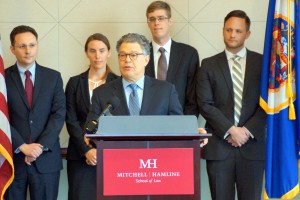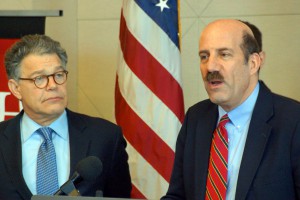U.S. Sen. Al Franken called on Republican senators to end their blockade of President Obama’s nominee for the Supreme Court, Merrick Garland, during a news conference at Mitchell Hamline School of Law on Thursday.
Franken, a Democrat from Minnesota and a member of the Senate Judiciary Committee, said he’ll reserve final judgment until he’s gathered more information but considers Garland “an exceptionally well-qualified candidate” to fill the seat of Justice Antonin Scalia, who died in February.
“The Senate needs to get to work,” Franken said. “The Supreme Court is too important, too essential to our system.”

Sen. Al Franken called on GOP leaders to end a block on Merrick Garland’s Supreme Court judicial hearings.
Republican leaders in the Senate have vowed not to take up judicial hearings or floor discussions of Garland’s nomination before this fall’s presidential election, or even before the end of the year.
Franken maintains the Senate’s constitutional duty is to provide the president with “advice and consent” after he names a nominee to the court.
“This type of obstruction marks an historic dereliction of the Senate constitutional duty,” Franken said.
Mark Gordon welcomed Franken to Mitchell Hamline as the school’s president and dean but then spoke personally, rather than officially, on the constitutional issues surrounding the nomination.
Gordon said he’s troubled by the refusal to consider Garland and questioned the reasoning behind the delay in the process. He said his feelings come out of his reverence for the U.S. Constitution and the constitutional system.
Gordon pointed out that while some argue we need to give the American people more of a voice in the selection, the Constitution itself establishes a very limited role for the public in determining judicial appointments.
“That is intentional, given the role of justices, and the desire to insulate the court from the vagaries of public opinion,” he said.
Gordon also noted that to the extent that the Constitution does give the public a role in the selection of justices, that role already occurred through the presidential and senatorial elections of 2012 and 2014, respectively.

Dean Mark Gordon said from a constitutional standpoint he’s troubled by the refusal to consider Supreme Court nominee Garland.
Gordon also questioned the argument that the president’s nomination power is diminished in his final year in office. He pointed out that the Constitution assumes the opposite: that the president has full authority until the expiration of his term.
He noted that the same is true for senators, and that’s why they continue to vote in lame-duck sessions, even if they just lost an election.
Gordon said in order for the national constitutional system to work best, there needs to be some “give in the joints.”
“The branches of government need to balance each other,” he said. “They need to compete with each other, but they also need to be respectful of each other.”
John Baker, a founding attorney of the Minneapolis law firm Greene Espel, said he fears the open Supreme Court seat could go unfilled well into 2017. Baker, who has taught as an adjunct professor at Mitchell Hamline, said that could leave many cases undecided by an eight-member court that splits its decisions down the middle.
“We need a U.S. Supreme Court that is functional to break ties,” Baker said, “and truly decide cases that four or more of the justices have already decided are important enough to hear.”
Sen. Franken said he’ll meet with Merrick Garland next week in an effort to learn more about his judicial record. He said he hopes the Senate gives the American people the same chance to get to know Garland through judicial hearings at the Capitol.
